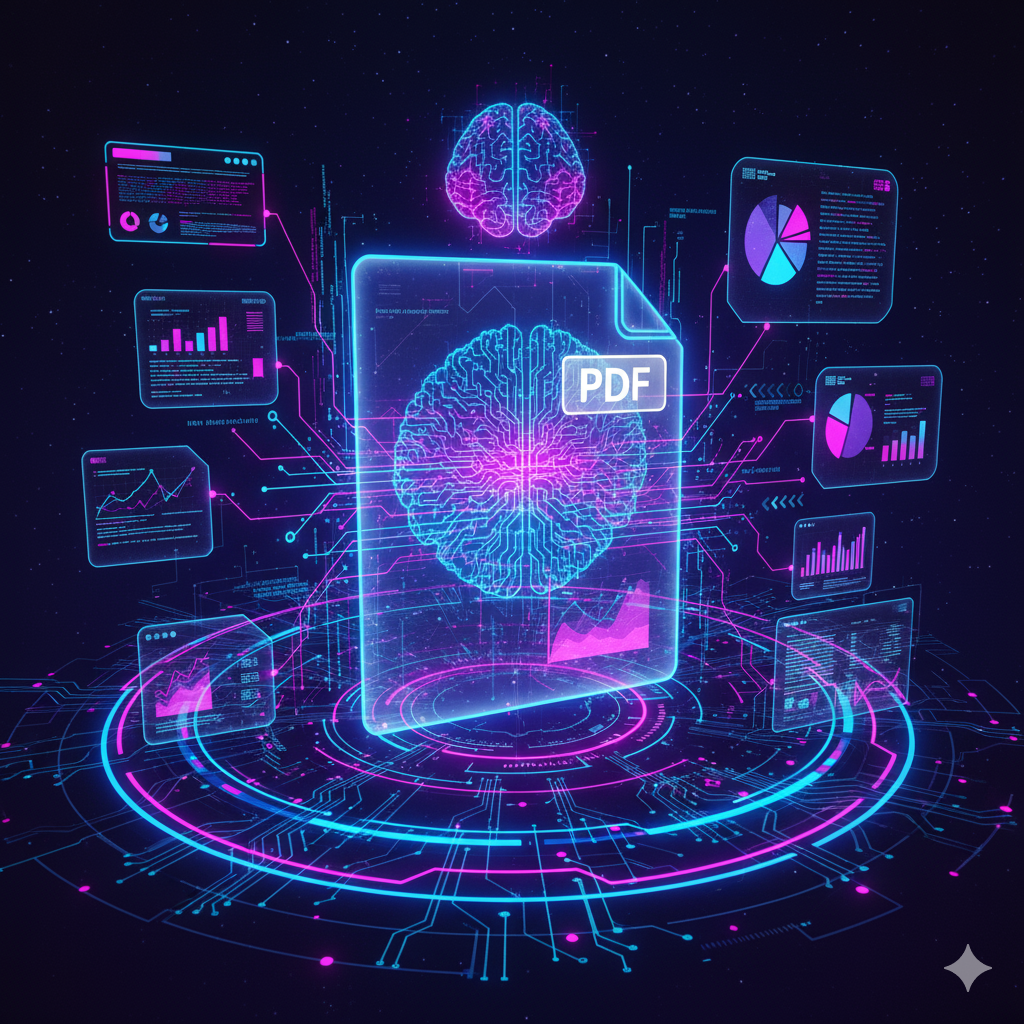
Artificial Intelligence is revolutionizing how we interact with documents. From simple OCR to sophisticated natural language understanding, AI document analysis has evolved dramatically. As we look toward 2025-2026, several groundbreaking developments are set to transform the landscape of intelligent document processing.
Current State of AI Document Analysis
Today's AI document analysis tools can already perform impressive tasks:
- Text Extraction: Converting scanned documents to searchable text with 99%+ accuracy
- Entity Recognition: Identifying names, dates, locations, and other key information
- Sentiment Analysis: Understanding the emotional tone of documents
- Summarization: Creating concise summaries of lengthy documents
- Question Answering: Providing specific answers from document content
Emerging Trends for 2025-2026
1. Multimodal Document Understanding
The next generation of AI will seamlessly process text, images, charts, and tables within documents. Instead of treating these elements separately, AI will understand their relationships and context, providing more comprehensive document analysis.
Real-World Impact
Imagine uploading a financial report and asking "How do the Q3 sales figures in the chart relate to the market analysis in section 4?" AI will analyze both the visual data and text to provide comprehensive insights.
2. Context-Aware Document Processing
Future AI systems will maintain context across multiple documents and conversations. They'll remember previous interactions and understand how different documents relate to each other within your workflow.
3. Real-Time Collaborative Analysis
AI will enable real-time collaborative document analysis where multiple team members can simultaneously interact with documents, share insights, and build upon each other's findings.
Breakthrough Technologies on the Horizon
Advanced Language Models
The next generation of language models will offer:
- Longer Context Windows: Processing entire books or document sets in one go
- Better Reasoning: Drawing complex inferences across multiple data points
- Domain Specialization: Models trained specifically for legal, medical, or technical documents
- Multilingual Mastery: Seamless analysis across different languages within the same document
Automated Workflow Integration
AI document analysis will integrate directly into business workflows, automatically:
- Routing documents to appropriate team members
- Extracting data for CRM and ERP systems
- Generating follow-up tasks and reminders
- Creating compliance reports and audit trails
Industry-Specific Developments
Legal Technology
Legal AI will advance to handle complex contract analysis, precedent research, and regulatory compliance checking with near-human accuracy. Expect AI that can identify potential legal risks and suggest alternative language in real-time.
Healthcare Documentation
Medical AI will process patient records, research papers, and clinical trials simultaneously to provide personalized treatment recommendations and identify potential drug interactions or contraindications.
Financial Services
Financial AI will analyze market reports, regulatory filings, and economic indicators to provide real-time risk assessments and investment recommendations based on comprehensive document analysis.
Privacy and Security Advancements
As AI document analysis becomes more powerful, privacy and security measures are evolving:
- Federated Learning: Training AI models without centralizing sensitive data
- Homomorphic Encryption: Processing encrypted documents without decryption
- Zero-Trust Architecture: Ensuring document security at every processing step
- Differential Privacy: Protecting individual privacy while enabling analysis
Challenges and Considerations
Ethical AI Development
As AI becomes more sophisticated, ensuring fairness, transparency, and accountability in document analysis becomes crucial. Organizations must implement ethical AI frameworks and regular bias audits.
Data Quality and Training
The quality of AI document analysis depends heavily on training data. Future developments will focus on creating more diverse, representative datasets and improving model robustness.
Preparing for the Future
To prepare for these advancements, organizations should:
- Start Small: Begin with current AI tools to build familiarity and workflows
- Invest in Training: Educate teams on AI capabilities and limitations
- Establish Governance: Create policies for AI use and data handling
- Plan for Integration: Consider how AI will fit into existing systems
- Monitor Developments: Stay informed about emerging technologies and standards
The Road Ahead
The future of AI document analysis is incredibly promising. We're moving toward a world where documents become truly interactive, intelligent assistants that can understand context, provide insights, and automate complex workflows.
The organizations that embrace these technologies early and thoughtfully will gain significant competitive advantages in efficiency, accuracy, and decision-making speed. The question isn't whether AI will transform document analysis—it's how quickly you'll adapt to leverage these powerful capabilities.
Experience the Future Today
While we wait for these exciting developments, you can already experience advanced AI document analysis with ChatPDF. Upload your documents and discover the power of intelligent document interaction.
Try Advanced AI Analysis